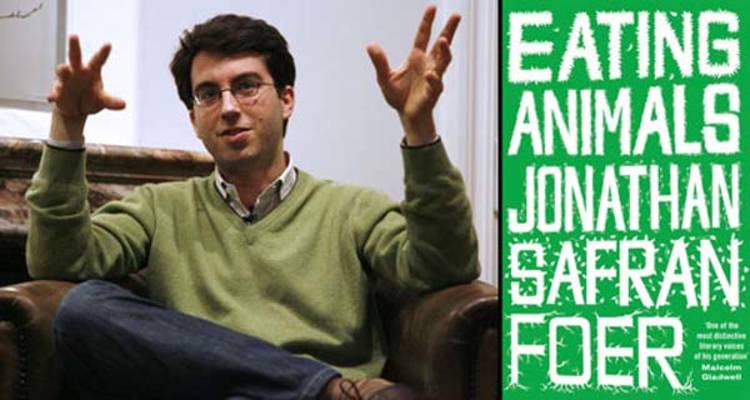


Sneakers and a pair of black trousers, an elegant shirt but with no jacket. Chatting with Jonathan Safran Foer in the hall of a Milan hotel is like talking to a long time friend while sipping a good “spritz” at the aperitivo.
His last book “Eating animals [2]” (Little, Brown and Company [3]) , was recently presented during an animated debate on vegetarianism at the Libreria Feltrinelli, [4] one of Milan cultural “hotspots”, while in the Us it had already caused a fuss. Why? Well, because the Brooklyn based writer spent the past year sneaking into farms and slaughterhouses, often after the sunset to avoid being caught by the unsuspecting owner . He did this to show the reader the cruelty with which animals are treated before being served as a delicious main course in a fancy New York restaurant as well as in each one of our homes. Foer guides you through 341 pages that reflect the indecent life conditions of the soon-to-become our food, not sparing any gruesome detail.
“Sexual desires are way stronger than food cravings. And almost everyone can control his sexual instincts while sometimes it just seems too hard to say no to a fillet steak”, tells Foer. In his opinion it is all about being civilised. “First thing, we need to want to live in a world where people would stop taking everything the think they can’t live without, mainly because our world cannot carry on like this”.
What has driven you to write this book? It has been more the ecological aspect of the story that caught you or was it all about the pity for the innocent creatures that end up in our plates?
I started to think about vegetarianism as a kid and I can say that at that stage in my life I felt definitely more concerned about the lives of the animals. When I started researching for the book I slowly realised that there is a general number of issues that concerne me. And I still think that even if the living conditions of animals were to get better I’d still not be eating meat.
Being a part of the Jewish culture and tradition did in some way influence what you write and how you write it?
For sure. I wouldn’t define myself as a religious person but the stories that we’ve been told when we were kids, the jokes we grew up with...it was all very “Jewish”. And inevitably all of these things shaped my imagination, my sense of humour, the way I tell stories.
What do you think could lead big companies in the food industry to change their breeding methods?
I can assure you that no one will suddenly wake up one day and decide to twist his way of doing business just because it is morally preferable. But I’m deeply convinced that things will change and in fact they already are changing. The reason is very simple: people are beginning to ask for different foodstuff. At the end of the day the key role in this campaign is once again played by consumers. In the States everything, the whole debate on healthy food, started when the request for the so called “organic” food rose to unprecedented levels. And now it’s impossible not to find them in our supermarkets.
So you think that people might stop eating hamburgers even in the Motherland of the Cheeseburger?
Do you know that Americans eat twice as much meat as Europeans? This is ridiculous. We would have to give up at least half of our meat based meals. If I believe people will do it? Well, I hope so. Eating habits change quite fast just like all other habits. Just think about smoking: until five or six years ago smoke was everywhere. Now they look at you like you’ve killed someone if you light up a cigarette. I would call it a “cultural evolution”.
“If nothing matters” is the Italian translation of “Eating animals” and it sounds a bit pessimistic. What did you want to communicate by using these words?
Those are the words my grandmother says in the first chapter. They reflect the moral of the story that she was telling in that passage, a story about hunger and salvation and strong principles. For me this means we always have to act on our principles, even when it doesn’t save you money or time, even when it is hard and it makes you look “weird”.
The “grandma character” has always been a predominant figure in all your books.
I know, the fact is that she’s always there, always in my head. The obvious conclusion is that my real grandmother is very important to me. She is the matriarch of our family and she is also what links me to a world that I’ve never known, a world that is now lost but still somehow live in the past, through memories. My entire family is originally from Eastern Europe and, if it wasn’t for the war (WWII, ndr) I will be still living there, speaking another language, probably telling different kind of stories. For me she is still that very thin thread that connects the Old World to the New.
Source URL: http://test.casaitaliananyu.org/magazine/focus/art-culture/article/eating-animals-discovering-indecent-life-conditions-our-food
Links
[1] http://test.casaitaliananyu.org/files/eating-animals21273588274jpg
[2] http://www.eatinganimals.com
[3] http://www.littlebrown.co.uk
[4] http://www.lafeltrinelli.it